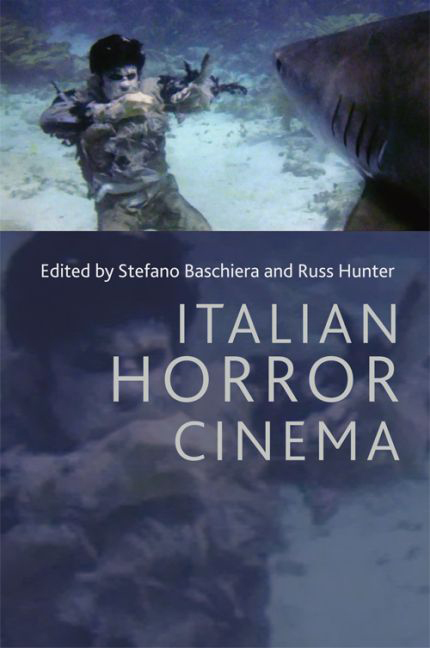Book contents
- Frontmatter
- Contents
- List of figures
- List of contributors
- Acknowledgements
- Introduction
- 1 Preferisco l'inferno: early Italian horror cinema
- 2 Domestic films made for export: modes of production of the 1960s Italian horror film
- 3 The 1980s Italian horror cinema of imitation: the good, the ugly and the sequel
- 4 Knowing the unknown beyond: ‘Italianate’ and ‘Italian’ horror cinema in the twenty-first century
- 5 Bavaesque: the making of Mario Bava as Italian horror auteur
- 6 The Argento Syndrome: aesthetics of horror
- 7 Scrap metal, stains, clogged drains: Argento's refuse and its refusals
- 8 The giallo /slasher landscape: Ecologia del delitto, Friday the 13th and subtractive spectatorship
- 9 Kings of terror, geniuses of crime: giallo cinema and fumetti neri
- 10 Political memory in the Italian hinterland: locating the ‘rural giallo’
- 11 The horror of progressive rock: Goblin and horror soundtracks
- 12 ‘The only monsters here are the filmmakers’: animal cruelty and death in Italian cannibal films
- 13 Italian horror cinema and Italian film journals of the 1970s
- Index
13 - Italian horror cinema and Italian film journals of the 1970s
Published online by Cambridge University Press: 12 September 2017
- Frontmatter
- Contents
- List of figures
- List of contributors
- Acknowledgements
- Introduction
- 1 Preferisco l'inferno: early Italian horror cinema
- 2 Domestic films made for export: modes of production of the 1960s Italian horror film
- 3 The 1980s Italian horror cinema of imitation: the good, the ugly and the sequel
- 4 Knowing the unknown beyond: ‘Italianate’ and ‘Italian’ horror cinema in the twenty-first century
- 5 Bavaesque: the making of Mario Bava as Italian horror auteur
- 6 The Argento Syndrome: aesthetics of horror
- 7 Scrap metal, stains, clogged drains: Argento's refuse and its refusals
- 8 The giallo /slasher landscape: Ecologia del delitto, Friday the 13th and subtractive spectatorship
- 9 Kings of terror, geniuses of crime: giallo cinema and fumetti neri
- 10 Political memory in the Italian hinterland: locating the ‘rural giallo’
- 11 The horror of progressive rock: Goblin and horror soundtracks
- 12 ‘The only monsters here are the filmmakers’: animal cruelty and death in Italian cannibal films
- 13 Italian horror cinema and Italian film journals of the 1970s
- Index
Summary
This chapter will focus on the domestic reception of Italian horror cinema in journals and magazines during the 1970s in order to begin a process of understanding the ways in which the genre was valued, discussed and (less commonly) analysed by Italian critics of the period. Although Italian horror in general has been subject to a considerable amount of scholarship, in fact, little has been written (in English, but also in Italian) about the criticism it aroused, and the way it was used by Italian critics to deal with genres and popular cinema. Given the entire history of Italian horror, the decision to focus on the 1970s is not casual and merits some preliminary contextualisation. Compared with the previous decade, which witnessed the blossoming of Bava, Ferroni, Freda and Margheriti's gothic genre, and the subsequent one, which accompanied the work of Dario Argento as a director and a producer of both his and others’ films, the brief but intense season of the cannibal movie and the exploitation films of directors like Fulci, Massaccesi and Lenzi, the 1970s were relatively ‘empty’. Most notably, there were a handful of titles that attempted to emanate the success of The Exorcist (William Friedkin, 1973), the release of an Argento film (Suspiria, 1977) and the production of another (Inferno, 1980), and little more. Nevertheless, if we consider the period in the light of the developments in Italian criticism at the time, the situation changes radically and in fact the 1970s fast become a crucial case study: it permits us to evaluate how horror as a genre is framed within the conceptual and ideological frameworks of criticism at that time and, moreover, the ways in which discussion of horror impacts on the birth of a critical and academic tradition.
As in the USA and the UK, in Italy the 1970s saw the notion of ‘genre’ debated with increasingly sophisticated methodologies in the field of film studies, with popular film becoming an object of interest for specialised journals. The reasons that brought about this change, however, were completely different. In the Anglo-American academy, genre was a foundational conceptual tool that was necessary for the ‘scientifically’ accurate study of popular cinema, and particularly Hollywood (Neale, 1999: 10), as well as for the broad validation of film studies within the British education system (Hutchings, 1995: 60–5).
- Type
- Chapter
- Information
- Italian Horror Cinema , pp. 207 - 221Publisher: Edinburgh University PressPrint publication year: 2016



